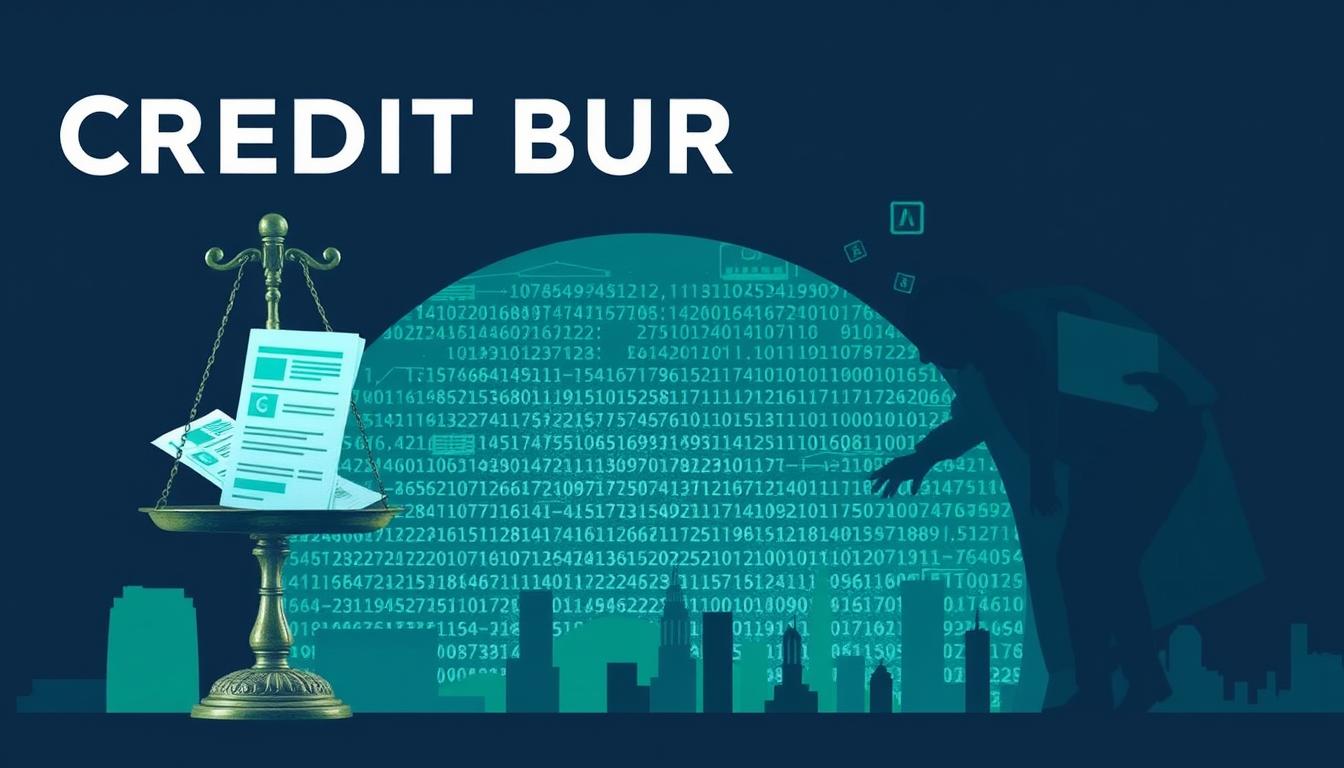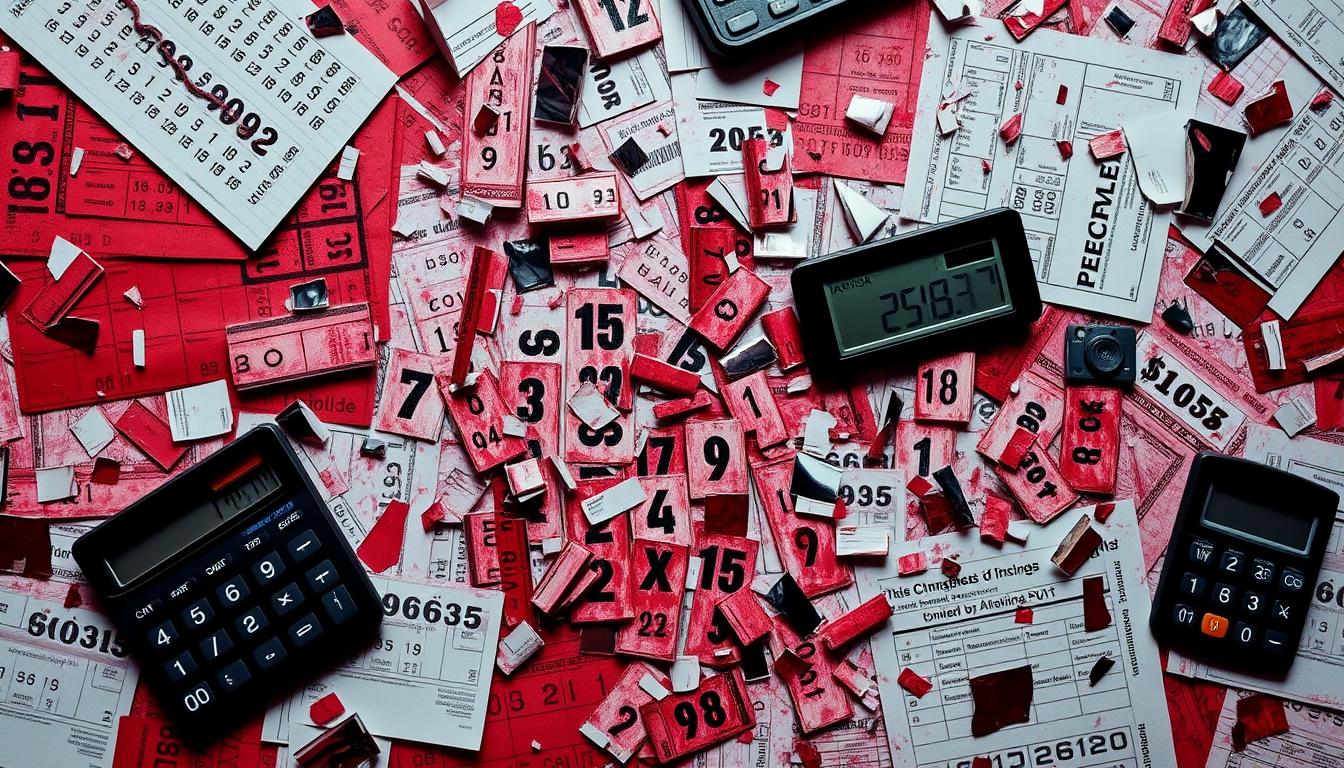Reporting bad debt to credit bureaus is vital for maintaining accurate consumer credit reports. This guide will help you report delinquent debt to Experian, Equifax, and TransUnion. We’ll cover the process step-by-step, ensuring compliance with Fair Credit Reporting Act guidelines.
Proper bad debt reporting notifies consumers of their delinquency. It also allows them to improve their credit standing. By following best practices, you protect your creditor rights and support credit rehabilitation efforts.
Key Takeaways
- Understand the definition of bad debt and the role of credit bureaus in consumer credit reporting
- Determine when to report bad debt to credit bureaus based on your organization’s policies and FCRA compliance
- Prepare the necessary documentation and verify consumer information before reporting bad debt
- Choose the right credit bureau(s) to report to and follow their specific reporting procedures and requirements
- Maintain accurate and up-to-date reporting, and address any consumer disputes or corrections promptly
Understanding Bad Debt and Credit Bureaus
Bad debt and credit bureaus are key to managing your financial health. Bad debt refers to unpaid or overdue debts that harm your credit score. It’s crucial to understand these concepts for better financial management.
What is Bad Debt?
Bad debt occurs when you fail to pay loans or credit cards on time. This can happen due to job loss, medical expenses, or poor money management.
When payments are late, the debt is often reported to credit bureaus. Experian, Equifax, and TransUnion are major credit bureaus that track your credit history.
The Role of Credit Bureaus
Credit bureaus collect and update consumer credit information. They gather details about credit accounts, payment history, and outstanding debts. This data helps lenders, landlords, and employers assess your creditworthiness.
Credit bureaus use this information to create comprehensive credit reports. They also calculate credit scores, which range from 300 to 850. These scores represent your overall creditworthiness.
- Credit bureaus collect and maintain consumer credit data from various sources, including lenders, creditors, and collection agencies.
- They generate credit reports that provide a comprehensive overview of an individual’s credit history and financial standing.
- Credit scores, calculated by credit bureaus, are numerical representations of an individual’s creditworthiness, ranging from 300 to 850.
- Lenders and other decision-makers use credit reports and scores to evaluate the risk associated with extending credit or approving various financial transactions.
Monitoring your credit and addressing issues can improve your financial well-being. Understanding bad debt and credit bureaus helps you take control of your finances. Stay informed to make better financial decisions.
When to Report Bad Debt to Credit Bureaus
Reporting delinquent accounts and charged-off debts to credit bureaus is crucial for debt recovery. Knowing when to report is key. Proper timing ensures a smooth and compliant credit reporting process.
Creditors should report bad debt after 30 days of non-payment. This alerts consumers to missed payments. They can then take steps to fix the issue.
If non-payment continues, creditors may report a charge-off after 180 days. For collections, report as soon as an agency takes over the account.
| Debt Status | Reporting Timeline |
|---|---|
| Delinquent Account | After 30 days of non-payment |
| Charge-off | After 180 days of non-payment |
| Collections | When the account is placed with a collections agency |
Following these rules keeps credit reporting accurate and timely. It gives consumers clarity about their financial duties. This approach aids debt recovery and upholds credit reporting integrity.

Preparing to Report Bad Debt
Accurate documentation of bad debt details is vital before reporting to credit bureaus. Verifying consumer information is equally important. Following Fair Credit Reporting Act (FCRA) rules ensures lawful reporting.
Documenting the Debt
Record all specifics of the bad debt thoroughly. Include original account details, amount owed, and delinquency date. Note any collection attempts made.
Keeping detailed records proves the debt’s validity. It also supports the reporting process effectively.
Verifying Consumer Information
Double-check the consumer’s full name, address, and social security number. This ensures the bad debt links to the right person. Proper identification helps verifying consumer information and prevents reporting errors.
| Documentation Required | Importance |
|---|---|
| Original Account Details | Establishes the validity of the debt |
| Delinquency Date | Determines the reporting timeline |
| Collection Attempts | Demonstrates efforts to resolve the debt |
| Consumer Personal Information | Ensures accurate documenting bad debt and FCRA compliance |
Careful documenting the debt and verifying consumer information leads to accurate reporting. This approach protects consumer rights and ensures compliance with regulations.
Choosing the Right Credit Bureau
Selecting the right credit bureau is crucial for reporting bad debt. Experian, Equifax, and TransUnion are the major players in consumer credit data. Understanding each bureau’s unique features helps ensure accurate reporting of delinquent accounts.
Major Credit Bureaus
Experian, Equifax, and TransUnion are the three main credit bureaus in the United States. They collect and maintain data on consumers’ credit histories and financial information. Each bureau has its own data sources, reporting policies, and credit scoring models.
- Experian is one of the largest credit reporting agencies, with a comprehensive database of consumer credit information. They are known for their robust credit monitoring services and advanced analytical tools.
- Equifax is another leading credit bureau that specializes in providing in-depth credit reports and credit scoring solutions. They are often recognized for their data integrity and innovative fraud prevention measures.
- TransUnion is the third major credit bureau, offering a wide range of credit-related products and services. They are respected for their commitment to consumer education and empowerment.
Consider specific reporting requirements when choosing a credit bureau for bad debt. Data accuracy and the bureau’s reputation are also important factors. Selecting the right bureau ensures accurate reflection of delinquent accounts on credit reports.

How to Report Bad Debt to Credit Bureaus
Reporting Procedures and Requirements
Reporting bad debt to credit bureaus is vital for your financial health. It helps maintain accurate credit reports. Let’s look at the key steps in this process.
Understanding each bureau’s procedures is crucial. This knowledge ensures effective reporting of bad debt.
- Gather Necessary Information: Collect all relevant details about the bad debt. This includes the consumer’s name, account number, and date of delinquency. The total outstanding balance is also important.
- Choose the Appropriate Reporting Method: Credit bureaus offer various reporting options. These include online portals, automated data feeds, and direct file submissions. Learn each bureau’s preferred method for smooth reporting.
- Comply with Reporting Requirements: Each credit bureau has specific guidelines for reporting bad debt. Follow these rules carefully. This ensures your reports are accepted and accurately reflected.
- Monitor and Update Reported Information: Regularly review and update the reported information. Notify credit bureaus of any changes in debt status. This includes payment arrangements or debt resolutions.
Following these procedures is crucial for maintaining credit report integrity. It also supports effective debt collection efforts.
By following best practices, you contribute to a reliable credit reporting system. This benefits both creditors and consumers.
“Accurate and timely reporting of bad debt is essential for both creditors and consumers to maintain a healthy credit ecosystem.”
Remember, reporting procedures may differ between credit bureaus. Research each bureau’s guidelines before reporting.
Maintaining Accurate and Compliant Reporting
Accurate bad debt reporting is vital for creditors and consumers. It’s crucial to keep precise records and report correct information to credit bureaus. This protects your interests and maintains the credit reporting system’s integrity under the Fair Credit Reporting Act (FCRA).
Updating Reported Information
Staying vigilant and proactive is essential when reporting bad debt. Promptly update credit bureaus when debt status or details change. This includes reporting paid, settled, or discharged debts, as well as correcting original information.
- Regularly review your reported bad debt information to ensure accuracy
- Promptly notify credit bureaus of any changes or corrections to the reported data
- Maintain detailed records of all communications and actions taken regarding bad debt reporting
- Adhere to FCRA compliance guidelines to protect the rights of consumers
Accurate bad debt reporting shows your commitment to responsible lending practices. It builds trust in your brand and supports the credit ecosystem. This ensures fairness and transparency for everyone involved.
| Key Considerations for Maintaining Accurate Reporting | Best Practices |
|---|---|
| Timely Updating of Information | Regularly review and update credit bureau reports with any changes to bad debt status or details |
| FCRA Compliance | Adhere to FCRA guidelines to protect consumer rights and ensure legal compliance |
| Detailed Record-Keeping | Maintain comprehensive documentation of all communications and actions related to bad debt reporting |

“Accurate and timely reporting of bad debt is not only a legal requirement, but also a critical component of responsible lending practices. Consumers deserve to have their credit history accurately reflected, and creditors must uphold this principle.”
Consumer Rights and Fair Credit Reporting
Understanding your credit reporting rights is vital. The Fair Credit Reporting Act (FCRA) protects consumers from unfair practices. It ensures accurate credit reports and allows consumers to dispute inaccuracies.
The FCRA grants consumers several important rights. These rights help maintain fairness in credit reporting.
- Access their credit reports for free once a year from each of the three major credit bureaus: Experian, Equifax, and TransUnion.
- Dispute any errors or inaccuracies they find on their credit reports, and have those errors corrected in a timely manner.
- Consent to the use of their credit information for certain purposes, such as employment or insurance applications.
- Receive notice when negative information is added to their credit report, and have the opportunity to explain their side of the story.
Businesses reporting bad debt must comply with the FCRA. They should report debt accurately and notify consumers properly. Responding quickly to disputes is also crucial.
Upholding consumer rights and fair credit reporting practices builds trust. It maintains the credit system’s integrity and fosters better business-customer relationships.
“Ensuring fair and accurate credit reporting is not just a legal obligation, but a moral imperative for businesses. It’s about respecting the rights of consumers and upholding the principles of a just and transparent financial system.”
Respecting FCRA rights creates a more transparent credit landscape. This benefits both businesses and customers. It promotes fairness and equity in financial dealings.
Handling Disputes and Corrections
Managing credit reporting disputes and errors is vital for maintaining accurate financial records. Consumers have rights, and credit bureaus must follow specific procedures. This process ensures the integrity of credit reporting.
Credit bureaus must investigate and resolve disputes about inaccurate or incomplete information. Consumers can initiate a dispute if they find errors in their credit reports. The bureau must then investigate within a set timeframe.
To address disputes, bureaus contact the information furnisher to verify data accuracy. If the furnisher can’t prove the information or doesn’t respond, the bureau must correct the consumer’s report.
Credit bureaus must also fix any reporting errors they discover. This includes updating incorrect information and removing resolved debts. Maintaining accurate and complete consumer credit reports is crucial.
| Key Steps in Handling Disputes and Corrections |
|---|
|
Proper dispute handling and corrections ensure accurate consumer credit reports. This accuracy enables fair lending decisions. The process protects both consumers and creditors in the credit reporting system.

“Maintaining accurate credit reports is not only a legal requirement, but also a vital component of a fair and functional credit system.”
Best Practices for Debt Collection and Reporting
Managing debt collection and reporting delinquent accounts are vital for business success. Following best practices helps streamline processes and maintain customer relationships. It also ensures compliance with regulations.
Documenting the debt collection process thoroughly is crucial. Keep detailed records of all debtor communications and payment agreements. This documentation can be valuable in disputes or legal proceedings.
- Prioritize open communication and transparency with the debtor. Provide clear explanations of the debt, payment options, and consequences of non-payment.
- Adhere to all applicable laws and regulations, such as the Fair Debt Collection Practices Act (FDCPA), to ensure ethical and compliant debt collection practices.
- Regularly review and update the reported information to credit bureaus, ensuring the accuracy and timeliness of the data.
- Develop a comprehensive debt collection policy that outlines the organization’s procedures, responsibilities, and escalation protocols.
These practices can improve the efficiency and effectiveness of debt collection efforts. They also help maintain a positive reputation and foster stronger customer relationships.
“Successful debt collection is not just about recovering owed funds, but about preserving customer trust and loyalty.”
Following these best practices can lead to improved cash flow and reduced write-offs. It can also enhance the overall financial health of the organization.
How to Report Bad Debt to Credit Bureau
Reporting delinquent debt to credit bureaus is vital for accurate credit reporting. As a creditor, follow proper procedures to ensure compliance. Document the debt thoroughly, including consumer details and account information.
Choose the right credit bureau for reporting bad debt. Experian, Equifax, and TransUnion are the major U.S. credit bureaus. Each has specific requirements for reporting delinquent accounts. Learn their guidelines before submitting reports.
Follow reporting procedures carefully. Provide all necessary information and supporting documents. Keep your reports accurate and up-to-date. Review reported information regularly and make corrections as needed.
Remember consumer rights under the Fair Credit Reporting Act. Address disputes and inquiries promptly and in compliance with the law.

